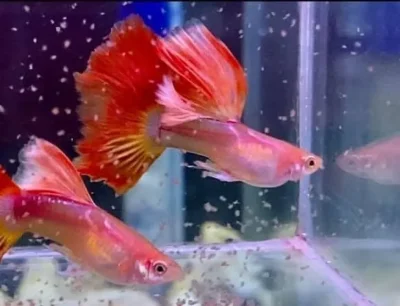The average Guppy lifespan is around 2 to 3 years. With good care and a healthy environment, they can live up to 3 years. Female guppies tend to have a longer lifespan than males. Proper nutrition, and appropriate water parameters are key factors in ensuring a longer lifespan of guppies. Ultimately, providing a stress-free, well-maintained aquarium environment and a healthy diet is crucial in extending the life of your guppies.

A significant determinant of a guppy’s lifespan is its genetics. You don’t have the control over genetics of a guppy. Most of the time, guppies with weak genetics will pass away before they reach 4 months of adulthood.
Though guppies breed in huge quantities around 20 to 30 percent of guppy fries pass away due to genetic makeup, poor water condition, or other disease-related issues. Guppies that are raised in ponds seem to have a higher survival rate than the ones that are brought up in aquarium tanks. The reason is that ponds are natural and large and there is plenty of algae in ponds that produces oxygen which takes care of the overall health of guppies.
How to Improve Guppy Lifespan?
In the following, I would like to give you some useful tips that I have been practicing for a very long time, on how to improve the lifespan of guppy.
Buy a healthy and quality Guppy
Since genetics play a big role in the lifespan of a guppy, I would advise you to buy a healthy guppy at the time of purchase. Subsequently, the fries of the guppy will also have a good life span.
Feed your Guppy with Quality Food.
Besides good genetics, guppies require quality Guppy food for a healthy and longer lifespan.
Guppy fish would eat almost anything you throw at them when they are hungry. You can feed them with commercial as well as homemade food. But I would always prefer commercial guppy food as I don’t want to take chances with my guppy and I don’t want to spend or waste too much time on food.
The guppy food you choose should be granular in nature or worm-like in shape so that your guppy food can go inside your guppy’s mouth. A quality guppy feed should ideally contain animal matter as well as some plant matter in it.
Deworm you guppy once a month
Deworming here simply means that you don’t feed anything for the whole day once in 30 days. This applies not only to guppies but to all fishes. Once you don’t feed them anything for a day, guppies excrete everything including worms. It improves the digestive system of guppies too. Make sure that you don’t prolong the fasting or deworming process as guppies will end up eating their excreta if they stay hungry for too long. This might give rise to additional problems.
Maintain the Right Tank Conditions
Water parameters are the most important factor for keeping not only guppies but all fish for that matter. Guppy fish are moderately hardy and can thrive in a wide range of water parameters. Here are the ideal water conditions for guppy fish:
- Water temperature: 74-82 °F
- Water pH: 6.5-8.5
- Water hardness (dGH): 7-11
In most cases, regular tap water is great for keeping your guppies well. Make sure that your water does not contain too much chlorine. Chlorine sucks up oxygen in water and increases the acidity of water. You may add some rock salt to neutralize the water if there is too much of chlorine.
Make sure 30 % water changes are made as per the size of your aquarium. If you have a filter you would not need frequent water changes. Once in a while, you may need to do a complete water change no matter what sort of filter you have.
Have a few natural things like stones, pebbles, driftwood, and a few plants if you can. All these things add up to creating a natural environment for your fish. Pebbles and driftwood catch algae which is good for your fish. Guppies eat algae too.
Aeration and Lighting
Guppies require some aeration compared to other fishes like goldfish where they require a lot of aeration. Keep the air flow rate moderate if you maintain an aeration pump in your tank. If the airflow rate is high the water tends to be flowing and this causes swimming problems for your guppies. All fishes including guppies love stable water. So keep your water stable as much as you can.
Guppies require some lighting during the day and darkness during the night. Guppies do sleep at night. They tend to remain static when the lights are off. So make sure you don’t have the light ON throughout the day.
Reduce Stress
- Poor water conditions
- Bad tank mates
- Overcrowded fish tank
- Lack of hiding space
- Lack of Natural things in your aquarium
- Too much lighting throughout the day
- Inadequate male-to-female ratio
- Constant flowing water due to high aeration from air pumps.
If you keep your guppies in a community tank make sure that you don’t keep them with aggressive fishes like barbs, because they will harm or end up eating your guppy fish.
Guppies feel safe guppies when they have hiding spaces. They do not hide though. However, it is a good idea to give them some sort of hiding space just for them to rest if they feel sick. Female guppies can be very stressed by male guppies chasing them continuously and they need rest. They will hide between objects or other aquarium decorations.
An overcrowded tank can also be a huge stress factor not only for guppies but for all fish. So make sure that you don’t overcrowd your tank.
Conclusion
Hope my article helps in your journey toward expanding the life span of your guppies. Having all said and done experience in fish keeping matters to an extent in keeping your fish alive.
